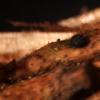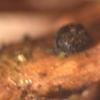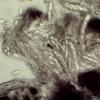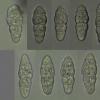
01-02-2026 19:29
 Nicolas Suberbielle
Nicolas Suberbielle
Bonjour, Marie-Rose D'Angelo (Société Mycologiq

31-01-2026 09:17
 Marc Detollenaere
Marc Detollenaere
Dear Forum,On decorticated wood of Castanea,I foun

29-08-2025 05:16
 Francois Guay
Francois Guay
I think I may have found the teleomorph of Dendros

31-01-2026 10:22
 Michel Hairaud
Michel Hairaud
Bonjour, Cette hypocreale parasite en nombre les

30-01-2026 21:20
Arnold BüschlenBryocentria brongniartii und B. metzgeriae mit ihr

21-01-2026 16:32
Gernot FriebesHi,I need your help with some black dots on a lich

07-12-2015 14:17
 Zugna Marino
Zugna Marino
Buon giorno a tutti, ad un primo momento, non ess

29-01-2026 10:04
 Jean-Paul Priou
Jean-Paul Priou
Bonjour à tous, Marcel LECOMTE président de L'A
is this Hysterobrevium smilacis?
Chris Yeates,
19-07-2012 16:46
 I struggled for a long time with this before "the penny dropped" - the shape of the ascoma being very short; this was a solitary pseudothecium on a fallen twig of Picea abies (non-native in Britain); ascospores 21.2-26.2 x 8.3-9.1µm; I have run it through Boehm's key and arrive at Hysterobrevium smilacis; comparison with Alain's http://www.ascofrance.com/search_recolte/2649? shows very similar ascospores.
I struggled for a long time with this before "the penny dropped" - the shape of the ascoma being very short; this was a solitary pseudothecium on a fallen twig of Picea abies (non-native in Britain); ascospores 21.2-26.2 x 8.3-9.1µm; I have run it through Boehm's key and arrive at Hysterobrevium smilacis; comparison with Alain's http://www.ascofrance.com/search_recolte/2649? shows very similar ascospores.My only reservation is the substrate - I can see that this taxon is highly plurivorous, but it has not been recorded (as far a I can see) on a Gymnosperm in Britain. Is that a problem?
Cordialement
Chris
J'ai lutté pendant longtemps avec cela avant «ça a fait tilt», la forme de l'ascoma étant très courte?, ce qui était un pseudothèce solitaire sur une brindille tombée de Picea abies (non-natif de Grande-Bretagne); ascospores de 21,2-26,2 x 8,3-9.1?m. Je l'ai parcouru le clé de Boehm et arriver à Hysterobrevium smilacis; comparaison avec http://www.ascofrance.com/search_recolte/2649 d'Alain ?montre ascospores très similaires.
Ma seule réserve est le substrat - Je vois que ce taxon est très «?plurivorous»?, mais il n'a pas été enregistrée (d'aussi loin que je peux voir) sur un gymnosperme en Grande-Bretagne. Est-ce un problème?
PS how do you say «plurivorous» in French?
Hans-Otto Baral,
19-07-2012 17:40

Re : is this Hysterobrevium smilacis?
From microscopy I actually do not see any difference. Gloniopsis smilacis is the same. I was aware of Hysterobrevium mori (previously Hysterographium) but not this combination.
The features of these genera are not clear to me, Boehm's key stresses only spore characters (mainly size). Seems mainly molecularly founded.
Zotto
The features of these genera are not clear to me, Boehm's key stresses only spore characters (mainly size). Seems mainly molecularly founded.
Zotto
Chris Yeates,
19-07-2012 17:52

Re : is this Hysterobrevium smilacis?
Alain GARDIENNET,
19-07-2012 22:38
Re : is this Hysterobrevium smilacis?
Hi Chris,
No problem for Hysterobrevium smilacis, typical ascospores. I have seen it on many different hosts (more than 15), including Pinus (Pinus pinaster and Pinus sylvestris). Why not Picea ?
Alain
Chris Yeates,
19-07-2012 22:50

Re : is this Hysterobrevium smilacis?
Merci beaucoup, Alain
Amitiés
Chris
Amitiés
Chris





